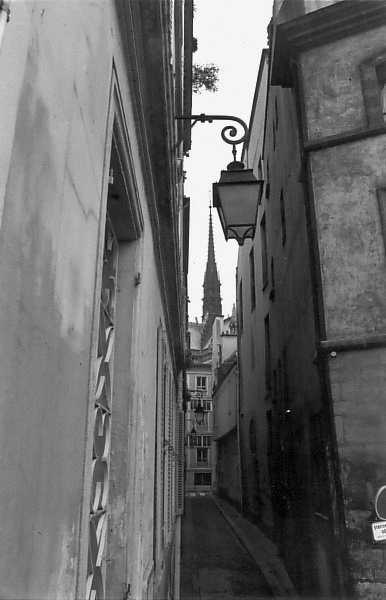Memoirs
Paul Zweig
(Other Books)

For those of us who have gone to Paris and have been put off --- by the chilly Parisians, the chilly weather, and the impenetrable elegance of the language --- we can only be envious of Zweig's mysterious ability to pick up the language almost instaneously, and, within months, to begin to teach himself the literature.
- It was shortly after the New Year. The bakeries were selling a hard, beige cake called the galette des rois. In the relentless chill of the bottom of the year, I decided that I was going to read all of French literature, starting at the beginning. It would be like going back to school, and yet it was mad, out of proportion.
He began with the oldest surviving work of French literature, the 12th century Chanson de Roland. From there, he went on to François Villon, and thence to Molière, Racine, Malesherbes.
- Then there are Fontenelle, Voltaire, and Diderot, "lots of Diderot."
"I rode along those rutted roads of old France, discoursed on fate and the weather. In my room, lit by a forty-watt bulb, feeling disembodied, as if still waiting to be born."
As I plowed my way though the well-rutted roads to Departures, my strongest reaction was one of envy. I had got to Paris for the first time when Zweig did. He moved into a run-down hotel, took up with a young and beautiful lady from Samoëns, fell immediately into the culture and the people, lost himself in the rich cultural pot au feu that is the Gallic way. Me? I hung around in the fabled cafes like Les Deux Magots in Saint Germain des Prés for a couple of days, met a young immigrant from Dakar, and when he offered to help me find a hotel to live, he got me down in a dark (I thought quite scenic) street, knocked me down and took my wallet. I should have known he was up to no good. He had a cold, and while we were sizing each other up, he kept blowing his nose on his shirt sleeve. I was on my way out of the country the next day.
No matter: if we didn't make it then, we can do it vicariously through Zweig's appealing, modest and charming memoir. So thoroughly does he become enmeshed in French culture that we cannot help but being involved as well. Zweig gets involved with several young ladies and his stories of love and loss are elegant, restrained, and true-to-life. They move around us in their tiny, fresh, frail dresses.
In my short time there, I do remember them with pleasure. "The girls were arrogant in their springtime colors," he tells us. "They were like flowers. They carried bags of books and smoked cigarettes. And the old ladies in black coats who sat all day in the garden, like the old people of my childhood on the boardwalk of Brighton Beach, shook their heads disapprovingly."
We envy Zweig, and his loves, and his ten years living in the alleys that overrun Paris like scraggly dog runs. He lives with Michèle in the 4th arrondissement, where "The buildings were run-down, the facades partly cracked, the stucco crumbled, the shutters hanging loose, their paint encrusted with layers of grime. The streets were barely wide enough for a car to pass." It may sound grim, but even the ancient alleys of Paris have a peckish charm that is not to be found in New York or San Francisco or Berlin or London.
Zweig gives us a picture of a Paris that you and I have both missed ... that will never exist again (before the Algerian War, before the new prosperity, before McDonalds) ... and we envy him that time and place. But his adventures can also be every American's foreign adventure if we choose to stay long enough to dig into the life of another world. (I settled later that year for a lengthy, blissful time in southern Spain).
Our expatriate experiences differ, but there are always parts common to all. Falling in love with another culture usually means falling in with the language, the food ... and probably one or two lovers or great new friends. There is always the exhilarating opportunity to put on a mask. This is Zweig meeting his first new friend in Paris, a friend he would come to know well over the next twenty years: "As I talked to him, I invented myself. I don't mean that I lied; I made myself into a story."
- I naturalized myself in the language that was still thick on my tongue but available, encrusted in my psyche by months of reading and talking, by the deciphering of store windows and food packages, by listening to the radio and going endlessly to movies.
"What I remember most about those evenings with Raymond was an ache in my jaw from talking too much."